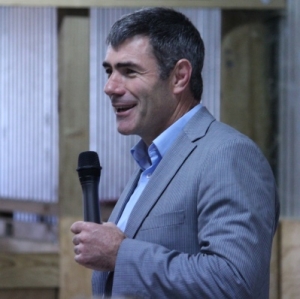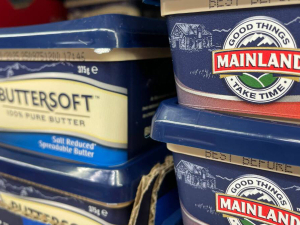Mangarata Farm in the Wairarapa opened its gates on the May 23 to the Minister of Primary Industries, Nathan Guy. Guy was invited to speak at Mangarata's field day with FarmIQ and Taratahi Agricultural Training Centre.
Mangarata is a sheep and beef farm owned by Taratahi Agricultural Training Centre in the Wairarapa. In 2011 it was selected as one of nine farms across New Zealand to represent the region on the FarmIQ programme.
Over 100 local farmers and agricultural representatives from across the lower North Island came to Mangarata to learn about FarmIQ and its focus on the integrated value chain as well as learning about the decisions made at Mangarata as a result of being involved in FarmIQ.
The guests were presented to by Guy, Taratahi chairman David Nelson, FarmIQ chief executive Collier Isaac and general manager Greg McSkimming, Taratahi Sheep and beef manager and farm support Paul Crick and Jane Murray, Silver Fern Farms chief executive Keith Cooper and Westpac economist Nathan Penny.
FarmIQ is working on a seven-year programme progressing six distinct projects covering governance, market, database, genetics, processing and farm productivity. Each project adds value to the supply chain while being reliant on each other to achieve success. The potential for gain begins before livestock are born by having the right genetics matched with the right on-farm systems, then capturing information through electronic identification (EID) and using processing technology to feed this back to the producer. Finally and critically, it involves matching products to markets.
In his speech Guy said that the future of the agricultural industry depends on programmes like this one. "You are the innovators. It's about measurement, management and ultimately making changes in behaviour. We need to reboot our rural communities, to make sure we have a viable industry".
Taratahi's sheep and beef manager, Paul Crick explained Taratahi's approach. "It's a little bit different from most. We're focused on the maternal side of the sheep. We're looking at improving ewe performance. We can't necessarily finish all animals at Mangarata because of our dry summers, so we want all the ewes to have multiples and wean their own body weight in lambs.
"We're keen to progress tracking and data collection across the mobs apply analysis to the farm's stock management programme. Having EID technology enables both the breeder and finisher to build longer lasting relationships. The ultimate will be to work with finishers who are also involved with FarmIQ, giving better financial returns for everyone.
"As soon as DNA testing is commercially viable we'd potentially build that into our breeding programme. We're in our third year of EID, with the hoggets coming into the system each year".
FarmIQ's vision is to create a demand-driven integrated value chain for red meat that delivers sustainable benefits to all participants: farmers, processors and marketers. These benefits won't come about overnight, instead, they will be delivered through a series of technologies over six years.



















